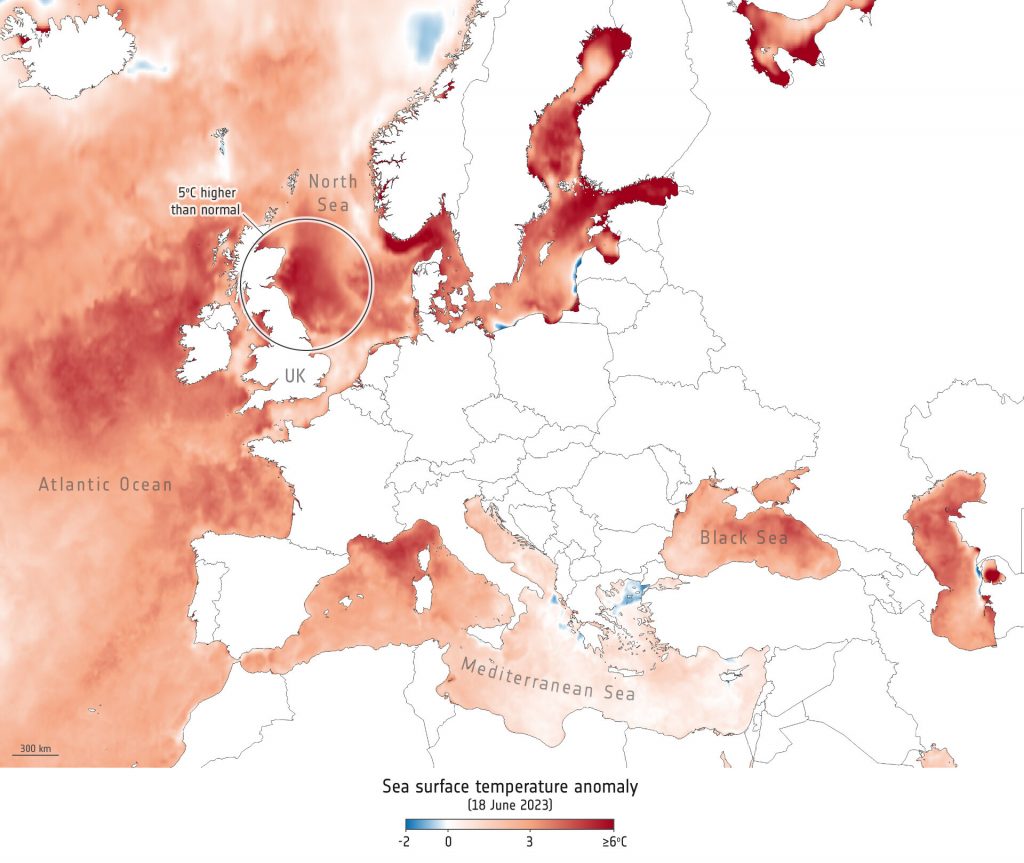Although the current high temperatures are expected to be temporary, experts anticipate more temperature records to be broken in the coming months due to the projected warming of the Pacific Ocean. Scientists already predict that 2024 may become the hottest year on record. [European Space Agency]
.
To what extent can the latest heatwave be blamed on climate change? Specifically, is climate change ‘causing’ the heating up of our seas?
A piece in today’s Devon Live looks at what the Met Office has been saying to the BBC:
Devon experiences unprecedented rise in sea temperatures
Sea temperatures in Devon are currently at unprecedented levels for June. Since 2019 sea temperatures have risen in Devon year on year but only by less than a degree each time. From 2019 to 2022 the average sea temperature rose from 14C to 15C in June. However, according to Sea Temperature Info, Devon is currently seeing some areas reach sea temperatures of nearly 18C. Budleigh Salterton is currently the warmest place to swim with records showing a temperature of 17.9C. Teignmouth, Sidmouth and Shaldon are not far behind recording 17.8C…
If sea temperature levels continue to rise it could have a detrimental impact on marine life, even killing off some species of fish and other sea life. So why has caused this sudden rise in temperature? It probably won’t surprise you to learn that the reason is partly human-caused climate change…
Speaking to the BBC, Professor Albert Klein Tank, the head of the Met Office’s Hadley climate research centre, said: “All of these elements are part of natural variation within the climate system which are coming together to elevate sea-surface temperatures to higher levels.” Other natural causes could be El Niño – which is essentially a band of warm ocean water in the Pacific Ocean. But it could also strangely be down to a reduction in pollution from shipping…The overall scientific consensus is that it is vital that long-term global temperatures do not exceed a 1.5C threshold. Failing to do so could result in the worst impacts of climate change. Luckily, the BBC reports that the current higher than expected sea temperatures should be a temporary fluctuation. But it does have a short-term effect and experts are already expecting more temperature records to be broken this year with 2024 likely to be the world’s hottest year on record.
Devon experiences unprecedented rise in sea temperatures – Devon Live
It is, however, slightly misleading to suggest that “the BBC reports that the current higher than expected sea temperatures should be a temporary fluctuation.”
If we go to the original research quoted in the full Devon Live article, the European Space Agency has recorded exceptionally high sea temperatures in European waters – and that it expects them to rise further.
UK suffers marine heatwave

Some of the most severe marine heat increases on Earth are occurring in the seas surrounding the UK and Ireland. Satellite measurements show that water temperatures in certain areas are above average for this time of year…
Although the current high temperatures are expected to be temporary, experts anticipate more temperature records to be broken in the coming months due to the projected warming of the Pacific Ocean associated with the development of an El Niño event. Scientists already predict that 2024 may become the hottest year on record.
Craig Donlon says, “Extreme Marine Heatwaves are not an everyday event in UK waters. Satellite data, together with data on the ground, will allow us to document the impact of this marine heatwave including stress on the marine ecosystem, the impact on industries such as aquaculture and fisheries, modification of local wind patterns and potential rainfall events that may emerge later.”
“This is a really startling global situation because the additional surface heating we see at this time will eventually be mixed into the ocean water column. Some of this excess heat will find its way into the Arctic Ocean via ocean currents through the Fram Strait and Norwegian Sea further exacerbating the demise of Arctic sea ice. We will be monitoring in detail to see how all these aspects evolve with great interest”.
ESA – UK suffers marine heatwave
This report was then taken on by the BBC, as referred to by Devon Live, which reiterated much of the above ESA findings, together with the observations from the Met Office:
Climate change: Sudden heat increase in seas around UK and Ireland – BBC News
Whilst scientists will be very careful about ‘predictions’, they are nevertheless absolutely clear that the current warming is due to human actions:
The evidence is clear: the main cause of climate change is burning fossil fuels such as oil, gas, and coal. When burnt, fossil fuels release carbon dioxide into the air, causing the planet to heat up.